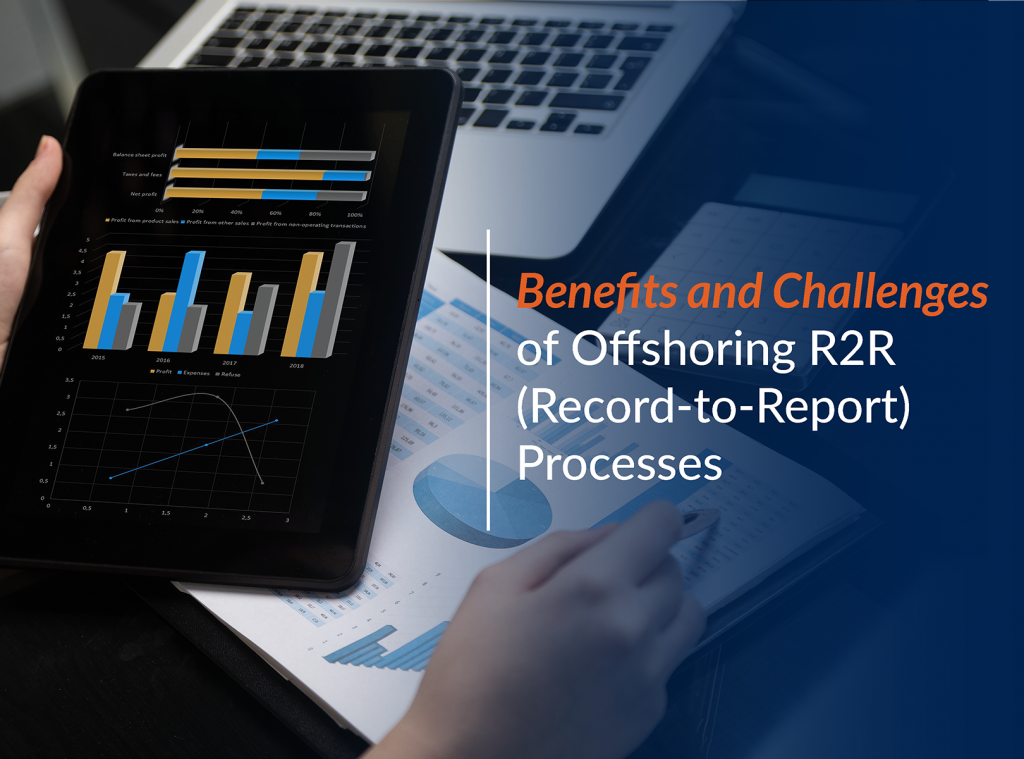In the realm of financial management, Record-to-Report (R2R) processes are pivotal. Offshoring, the strategic outsourcing of financial tasks to external entities, plays a crucial role in enhancing global competitiveness. In this blog, we delve into the benefits and challenges of offshoring R2R, offering insights to empower decision-makers in navigating this complex landscape for sustained organizational success.
Benefits of Offshoring Record-to-Report
- Cost Savings: Offshoring R2R brings about significant cost savings, primarily driven by variations in labor costs between countries. Companies can capitalize on lower wage structures in offshore locations, coupled with operational and infrastructure cost reductions, leading to a more economical financial landscape.
- Access to Global Talent: Offshoring opens the door to a diverse pool of skilled professionals located in different regions. This access to global talent allows organizations to leverage specialized expertise, fostering innovation and efficiency within their R2R processes.
- Focus on Core Business Functions: By offshoring R2R tasks, companies can redirect their internal resources and attention towards core business functions. This strategic shift enables organizations to concentrate on their strengths, enhancing overall competitiveness in the market.
- Scalability and Flexibility: Offshoring R2R provides scalability and flexibility to adapt to changing business needs. Companies can easily scale their operations up or down based on fluctuations in demand, without the constraints of managing a fixed in-house workforce.
In embracing offshoring for Record-to-Report processes, organizations not only unlock cost efficiencies but also gain access to a global talent pool, allowing them to strategically focus on core competencies and adapt to the dynamic needs of the business environment.
Challenges of Offshoring R2R
- Quality Control and Compliance Risks: Offshoring R2R processes introduces challenges in maintaining consistent quality standards across borders. Differences in work cultures and regulatory frameworks may pose risks, impacting the accuracy and compliance of financial reporting.
- Cultural and Communication Barriers: Language barriers and cultural differences can hinder effective communication between onshore and offshore teams, potentially leading to misunderstandings or delays.
- Dependency and Security Concerns: Over-reliance on an offshore provider can create dependency issues. Additionally, concerns regarding data security and privacy may arise, especially in a global setup where sensitive financial information is shared across borders.
- Potential Hidden Costs: Unforeseen expenses related to offshoring, such as additional training, management overhead, or unexpected regulatory compliance costs, can emerge. Managing and mitigating these unexpected costs requires vigilant planning and continuous monitoring.
While offshoring R2R processes presents numerous benefits, organizations must be mindful of potential drawbacks. Addressing issues related to quality control, communication barriers, dependency concerns, and hidden costs through proactive strategies is essential for a successful offshoring implementation.
StratShore’s Approach to Offshoring R2R Processes
In our pursuit of excellence in Record-to-Report (R2R) processes, StratShore employs a comprehensive approach to balancing the benefits and drawbacks of offshoring. Here’s how we strategically leverage benefits while mitigating challenges:
1. Strategies for Leveraging Offshoring Benefits
- Diligent Partner Selection: At StratShore, we understand the importance of diligent partner selection. We meticulously evaluate potential offshore partners based on their track record, expertise, and cultural alignment. Through thorough due diligence, we ensure they adhere to industry standards and compliance requirements.
- Clear Communication Channels: We establish clear communication channels between both onshore and offshore teams, fostering transparent communication through regular updates, virtual meetings, and collaboration tools. This approach helps overcome language and cultural barriers, ensuring seamless collaboration.
- Continuous Training and Skill Enhancement: Additionally, we invest in continuous training programs for our offshore teams to keep them abreast of industry trends, compliance changes, and evolving R2R methodologies. This commitment to skill enhancement ensures a consistently high level of expertise and performance.
2. Mitigating Challenges of Offshoring R2R Processes
- Robust Quality Control Measures: StratShore implements robust quality control measures to maintain standards across borders. We conduct regular audits, performance reviews, and adhere to standardized procedures to minimize risks associated with data accuracy and compliance.
- Data Security Protocols: Data security is a top priority for us. We prioritize the implementation of robust protocols and encryption measures, ensuring compliance with global data protection regulations. Regular security audits help us identify and address vulnerabilities promptly.
- Contingency Planning: Additionally, we develop contingency plans to address potential challenges, such as unexpected costs or disruptions in operations. Having predefined strategies in place enhances our ability to adapt to unforeseen circumstances.
3. Tools and Practices for Effective Management:
- Collaboration Platforms: StratShore utilizes advanced collaboration tools and platforms to facilitate real-time communication and project management. This enhances coordination between our onshore and offshore teams, fostering a cohesive working environment.
- Performance Metrics and KPIs: We define clear performance metrics and key performance indicators (KPIs) for R2R processes, regularly monitoring and evaluating these metrics to ensure both teams meet predefined standards and objectives.
- Continuous Improvement Initiatives: Additionally, we foster a culture of continuous improvement by regularly evaluating and optimizing offshoring processes. Feedback from both onshore and offshore teams is encouraged to identify areas for enhancement and innovation.
In conclusion, StratShore’s strategic and holistic approach to offshoring R2R processes ensures the effective balancing of pros and cons, ultimately leading to success in the Record-to-Report domain.
Importance of Careful Planning before Offshoring your R2R Processes
- Thorough Cost-Benefit Analysis: Conduct a comprehensive cost-benefit analysis before embarking on offshoring initiatives. Understand the total cost of ownership, including hidden expenses, to make informed decisions about the financial viability of offshoring R2R.
- Strategic Roadmap: Develop a strategic roadmap that aligns offshoring initiatives with overall business objectives. This involves clearly defining roles, responsibilities, and performance metrics for both onshore and offshore teams.
- Risk Assessment: Conduct a thorough risk assessment to identify potential pitfalls. This includes evaluating regulatory compliance risks, cultural challenges, and any dependencies on the offshore partner. Mitigation plans should be integrated into the overall offshoring strategy.
Conclusion
In nutshell, Offshoring Record-to-Report (R2R) comes with both benefits and challenges. The benefits included cost savings, access to global talent, focus on core functions, and scalability. On the flip side, challenges such as quality control risks, communication barriers, and potential hidden costs were also discussed.
Now, it is up to you to conduct thorough due diligence before deciding on offshoring R2R. Selecting the right partners, establishing effective communication, and proactively addressing potential challenges are essential steps for success.
By doing so, organizations can position themselves for sustained growth and efficiency in the evolving financial landscape!




